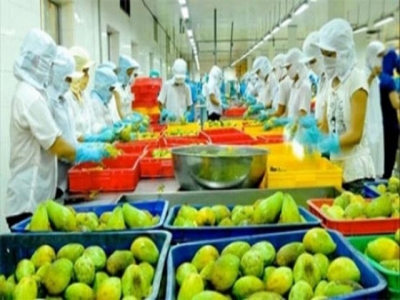Fruit and vegetable exports decline during first quarter

The export turnover of fruits and vegetables for the first three months of 2019 fell by nearly 10 percent in comparison to the same period last year, according to the Ministry of Agriculture and Rural Development.
This drop can largely be attributed to a decline of up to 14.7 per cent in export of fruits and vegetables to the Chinese market. This fall is down to the harvest period in China coinciding with the harvest of a number of types of Vietnamese fruits.
In March, the export value of fruit and vegetables reached US$294 million, bringing the export value of these products during the first quarter to US$897 million, a drop of 9.3 per cent against last year’s corresponding period.
Consistently, China has always been the top market for importing fruits and vegetables from Vietnam and currently holds 73 to 74 percent of the overall market share.
A representative from a local export business said the recovery of the Chinese market in March is predicted to allow Vietnamese fruit and vegetable exports to enjoy robust growth as seen in previous years.
The nation’s fruit and vegetable exports to other Southeast Asian markets also suffered a decrease of 24.7 per cent to US$21.21 million, accounting for an overall drop of 3.6 per cent.
Meanwhile, strong growth was seen in the EU market with an increase of 44.21 per cent, and the Republic of Korea which saw a rise of 41.7 per cent.
Economists have advised many of the country’s businesses to increase their official exports to China rather than opting for unofficial exports in order to ensure sustainable growth, improve product quality to meet strict requirements with regards to their origin traceability, and quarantine certificates set by Chinese importers.
Related news
 Large-scale fields still face difficulties
Large-scale fields still face difficulties The situation of rice consumption is not favorable in the first quarter of 2019, some of the enterprises contracting large-scale fields does not buy all
 Global economic integration helps Vietnam expand agri-products markets
Global economic integration helps Vietnam expand agri-products markets Vietnamese agro-forestry-fishery products are now available in 180 countries and territories thanks to Vietnam’s increasing global economic integration
 At the time of ATIGA, sugarcane is still struggling
At the time of ATIGA, sugarcane is still struggling After a 2-year delay, from January 1, 2020, quotas on sugar imports from ASEAN will officially be removed and have an import tax rate of 0% in accordance